JUNE 2025 - DECEMBER 2026
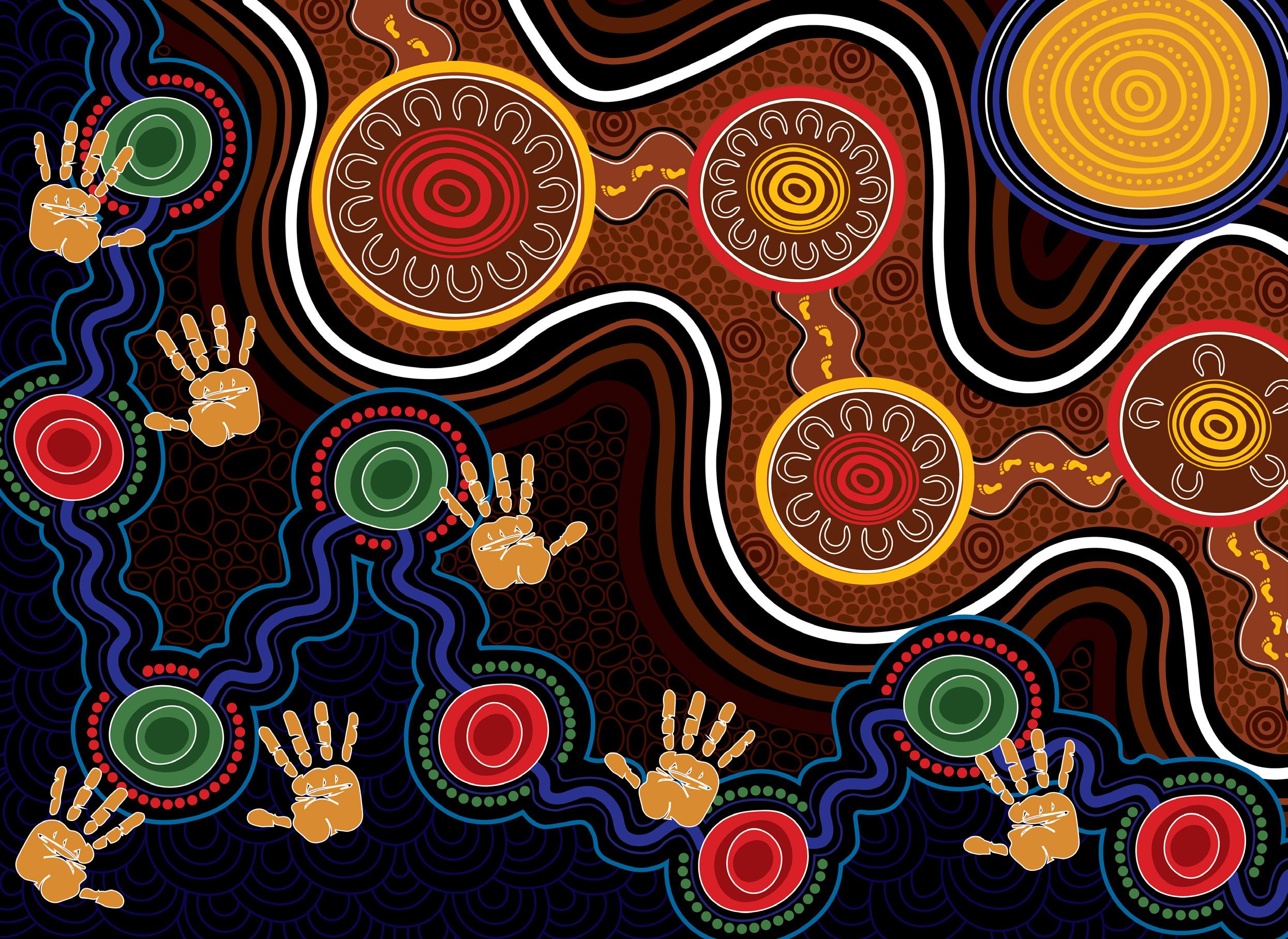
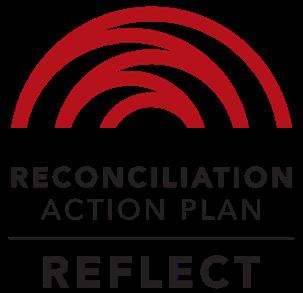
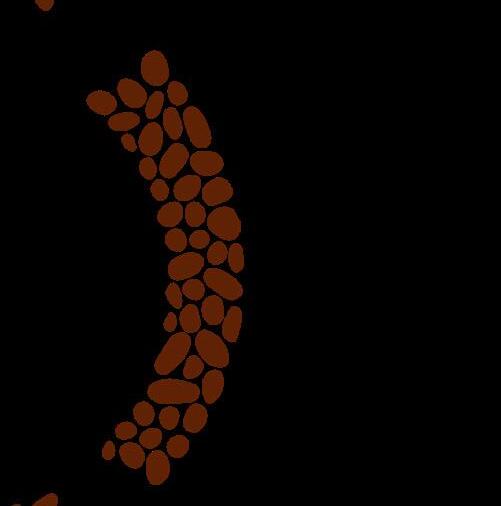

JUNE 2025 - DECEMBER 2026




A commitment of engagement and healing
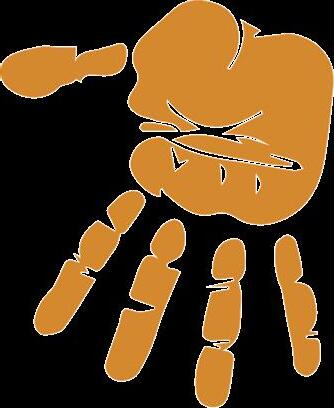
It is with a spirit of hope and commitment that I am very pleased to present the Archdiocese of Perth Reflect Reconciliation Action Plan (RAP). The Reflect RAP is an important way for the Catholic Church to engage with our Aboriginal and Torres Strait Islander brothers and sisters as we seek to journey towards justice, healing and unity. As members of the Catholic Church, we are called to reflect deeply on our role in fostering reconciliation, both within our communities and in the broader society.
The preparation of this Reflect RAP has been possible because of the involvement of Elders from local groups, young people and those deeply committed to fostering reconciliation. Their advice has been welcomed and honoured throughout the Plan.
The formal endorsement of the second Reflect RAP is valued recognition of our desire to be part of the reconciliation journey, and it encourages us to continue reaching out to Aboriginal and Torres Strait Islander peoples, so that new relationships and opportunities can be created from better mutual understanding and cooperation.

The Reflect RAP is the first step along the road of the process of reconciliation. It can be seen as a step of renewal in the context of the long history of interaction since the Catholic Church came to this land. The Plan challenges us to examine our practices and engage in meaningful dialogue.
Our history has been complex. At times, some events have been helpful to building relationships, but at other times, events have been very unhelpful. The Archdiocese acknowledges this truth. Each of our communities and agencies, wherever they may be, will be invited to receive the Reflect RAP so that it will be the basis for initiatives to develop understanding, forge positive and respectful relationships and promote collaboration with local Aboriginal and Torres Strait Islander Peoples.
I commend the Reflect RAP for consideration and discernment to each parish community, Archdiocesan agency and office. May it challenge us and provide a path to new and lifegiving partnerships.
Let us move forward with prayerful hearts and a steadfast commitment to reconciliation, knowing that together, through God’s grace, we can create a more harmonious and just world.
Most Rev Donald G Sproxton Auxiliary Bishop of Perth Chair, Archdiocese of Perth Reflect Reconciliation Action Plan Working Group


Reconciliation Australia welcomes the Catholic Archdiocese of Perth to the Reconciliation Action Plan (RAP) program with the formal endorsement of its inaugural Reflect RAP.

The Catholic Archdiocese of Perth joins a network of more than 1,100 corporate, government, and notfor-profit organisations that have made a formal commitment to reconciliation through the RAP program.
Since 2006, RAPs have provided a framework for organisations to leverage their structures and diverse spheres of influence to support the national reconciliation movement. The program’s potential for impact is greater than ever, with close to 3 million people now working or studying in an organisation with a RAP.
The four RAP types — Reflect, Innovate, Stretch and Elevate — allow RAP partners to continuously develop and strengthen reconciliation commitments in new ways. This Reflect RAP will lay the foundations, priming the workplace for future RAPs and reconciliation initiatives.

The RAP program’s strength is its framework of relationships, respect, and opportunities, allowing an organisation to strategically set its reconciliation commitments in line with its own business objectives, for the most effective outcomes.
These outcomes contribute towards the five dimensions of reconciliation: race relations; equality and equity; institutional integrity; unity; and historical acceptance.
It is critical to not only uphold all five dimensions of reconciliation, but also increase awareness of Aboriginal and Torres Strait Islander cultures, histories, knowledge, and leadership across all sectors of Australian society.
This Reflect RAP enables the Catholic Archdiocese of Perth to deepen its understanding of its sphere of influence and the unique contribution it can make to lead progress across the five dimensions. Getting these first steps right will ensure the sustainability of future RAPs and reconciliation initiatives, and provide meaningful impact toward Australia’s reconciliation journey.
Congratulations Catholic Archdiocese of Perth, welcome to the RAP program, and I look forward to following your reconciliation journey in the years to come.
Karen Mundine Chief Executive Officer Reconciliation Australia

The Catholic Archdiocese of Perth acknowledges the Noongar and Wangkathaa people who are the Traditional Custodians of this land. We recognise and honour their deep connection to these lands and their ongoing contributions to the cultural and spiritual heritage of the region. We acknowledge the Elders, past and present and we are grateful for their stewardship of the land and waters, which have sustained Aboriginal and Torres Strait Islander peoples for more than 60, 000 years.
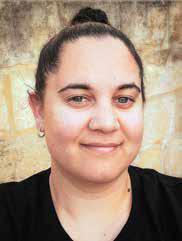
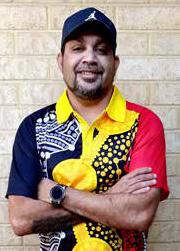
Acacia Collard is a Badimia-Yamatji Ballardong Noongar woman from Perth WA. Acacia has been creating artwork for over a decade and has done so using various mediums including canvas painting, sand murals and digital designs. Acacia Cultural Designs was officially created in 2017 and has since grown into a versatile Aboriginal art and design business working with a range of organisations, corporates and community groups.
Kevin Bynder was born in Perth 1975 to a Whadjuk-Yuet Nyungar Mother and a Widi-Badmimia Yamatji Father. He started painting at the age of 23, in Fitzroy Crossing, then moved to Broome where he opened his first art studio. Since then, Kevin has sold hundreds of pieces of art both locally, nationally and internationally. Kevin worked at La Salle Catholic College for 4 years where he helped teach Indigenous students from remote communities. He generously donates artwork to Foundations and for other organisational fundraisers.
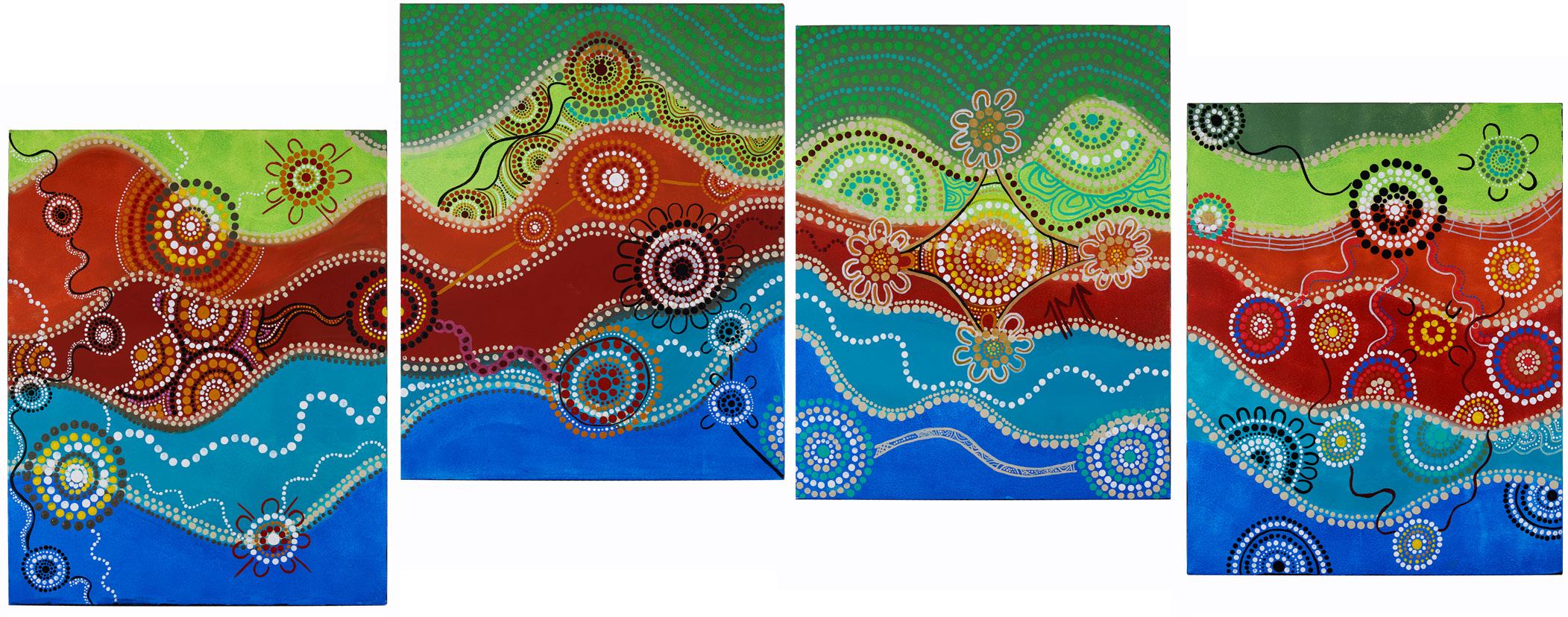

Nih ngulla kaart koort - We learn and listen with an open heart
Elders, Robyn Collard Whadjuk - Ballardong Yorga, Lennett Sandy –Wardandi - Binjareb Yorga, and Donella Brown – Yawuru are honoured and privileged to endorse the Catholic Archdiocese of Perth’s Reflect RAP 2025.


Reconciliation is a concept that is known to all Catholics and continues to be put into the context of the lives of all Aboriginal and Torres Strait Islanders peoples and the broader community. The Reconciliation Movement began in the 1990’s by the Council of Aboriginal Reconciliation and is now known as Reconciliation Australia. It has become a grassroots movement which today is embraced by Federal and State governments as well as corporate and not-for-profit organisations. For the Perth Catholic Archdiocese this is an important moment in time for this Reflect RAP to be embraced in a genuine manner and to be a practical roadmap of our future as a people for reconciliation.
We have been connected to Country for thousands of years. Aboriginal and Torres Strait peoples of Australia have had to overcome many challenges with colonisation and its impact on cultures. This Reflect RAP gives the Church an opportunity to raise awareness with truth telling towards healing the past. By showing respect, dignity, nurturing, and protecting the land and the people, we can work towards a safe and healthy future for the generations to come.
We acknowledge kalyakoorl - the past, the present and the future.
The celebration of Aboriginal and Torres Strait Islander Sunday at the beginning of NAIDOC week is an invitation for all Catholics to engage with these celebrations and to learn from each other with an open heart.
This Reflect RAP is the opportunity for Aboriginal and Torres Strait Islander peoples and the wider Catholic Church community to live out this enduring and important message that Pope St John Paul II left in his letter to the Aboriginal People of Australia.
“You are part of Australia and Australia is part of you. And the Church herself in Australia will not be fully the Church that Jesus wants her to be until you have made your contribution to her life and until that contribution has been joyfully received by others.”
Pope St John Paul II (1986).
In God’s time, we will come home together as a Church and people of reconciliation.





The core business of the Catholic Archdiocese of Perth primarily revolves around spiritual and pastoral leadership, community services and administration of its agencies and parishes. In particular, providing religious services and spiritual guidance; engaging in charitable work such as those facing hardship and supporting social justice initiatives; fostering a sense of community amongst those attending parishes and promoting activities that encourage faith and fellowship; and growing and nurturing the Catholic faith for individuals, families and communities.
The essential mission of the Catholic Church is to continue the works of Jesus Christ. This is done through its work in parishes, schools, hospitals, welfare groups and many other organisations. Excluding schools, hospitals and independently incorporated bodies, the Catholic Archdiocese of Perth itself, and through its parishes, owned-and operated agencies and offices employs 330 people with three identifying as Aboriginal and or Torres Strait Islander peoples.
The Catholic Archdiocese of Perth is bounded in the north by the Diocese of Geraldton, in the east by the South Australian border, and in the south by the Diocese of Bunbury and by the Southern Ocean in its south-east corner. The Archdiocese has 109 parishes, of which 94 are located in the metropolitan area and 15 in country areas. Additionally, it has 23 owned agencies and offices located in the Perth metropolitan area.
Our mission is to give expression to a Christ – centred, faithful, vibrant, welcoming, inclusive and mission-orientated Church, one which will enrich our own lives and the lives of all who we encounter and seek to serve.
Our vision is that we see ourselves, and conduct ourselves, as people called to walk together in the footsteps of the Good Shepherd.

In living out our mission and vision, the Catholic Archdiocese of Perth is embarking on a proactive and committed journey of reconciliation with local Aboriginal and Torres Strait Islander peoples by developing the Reflect RAP. The Archdiocese seeks to do this in a spirit of relationship building, humility, learning, truth telling and truth listening with Aboriginal and Torres Strait Islander peoples. Our approach will include reporting regularly on Reflect RAP progress, engaging with Aboriginal and Torres Strait Islander stakeholders to seek guidance and advice on progress, activities and gaps in our understanding and ensuring our leadership teams support the deliverables of the Reflect RAP. These processes will engage Aboriginal and Torres Strait Islander peoples along our Reflect RAP journey.
The Church acknowledges Aboriginal and Torres Strait Islander peoples’ past and current experience of the Church are complex. In the past, there has been significant harm inflicted on individuals, families and Aboriginal and Torres Strait Islander cultures. The Church had a role in children being forcibly removed from their families. This practice affected so many Aboriginal and Torres Strait Islander peoples that the people are known as the Stolen Generation. This has left a painful legacy of racism, trauma, loss and disconnection that has been passed on through generations. The National Apology, delivered on February 13, 2008, by the then Prime Minister, Kevin Rudd was a profound acknowledgement of historical injustices and a beginning journey towards reconciliation. It represents a moment in history of truth telling where Australia as a nation, was confronted by its past.
In addition to some of the practices that are today known as damaging to Aboriginal and Torres Strait Islander cultures, the Church is working towards reconciliation in multiple ways. The recent Plenary Council sought to place reconciliation with Aboriginal and Torres Strait Islander peoples as a primary focus with recommendations for the Catholic Church in Australia to participate in cross-cultural competency for all clergy, staff and volunteers. Alongside this training, providing formation and learning opportunities to further understand the needs of Aboriginal and Torres Strait Islander peoples, their cultures and spiritualities. In engaging with these recommendations, the Catholic Archdiocese of Perth is working towards practical application of Pope St John Paul II 1986 commitment when he met with Aboriginal and Torres Strait Islander peoples in Alice Springs proclaiming, “Australia will not be fully the Church that Jesus wants her to be until you have made your contribution to her life, and until that contribution has been joyfully received by others”. The Reflect RAP provides another avenue that ensures reconciliation is a core element in the work of the Catholic Archdiocese of Perth.
We will have a staged introduction of the Reflect RAP, with the intention of starting small and gradually expanding throughout our owned and operated agencies and parishes. Our sphere of influence encompasses our Central Office and Administrative Organisations such as the Tribunal, Archives and the Office of Communications.
The approaches we want to progress through are reflected in the Catholic values and processes employed in developing this Reflect RAP. Drawing upon Catholic Social Teachings, our values focus upon an abiding respect for the inherent dignity of all people and our commitment to justice, fairness and the centrality of building God’s Kingdom here in the Catholic Archdiocese of Perth.
By modelling Reflect RAP at a Diocesan level, we hope to enable parishes and agencies to adapt their own circumstances. In addition to this, there is an opportunity to tell the agency or parishes’ story so far and to document positively their achievements and goals in reconciliation. The Archdiocese’s Reflect RAP Working Group (WG) consists of half Aboriginal and Torres Strait Islander peoples and half wadjella (non-Aboriginal person) staff from across our parishes and agencies. The champion for our Reflect RAP is the Auxiliary Bishop of Perth Donald Sproxton DD VG.
We have a timeline of 18 months for completion and are following the Reconciliation Australia’s framework of ‘Relationships, Respect, Opportunities and Governance’

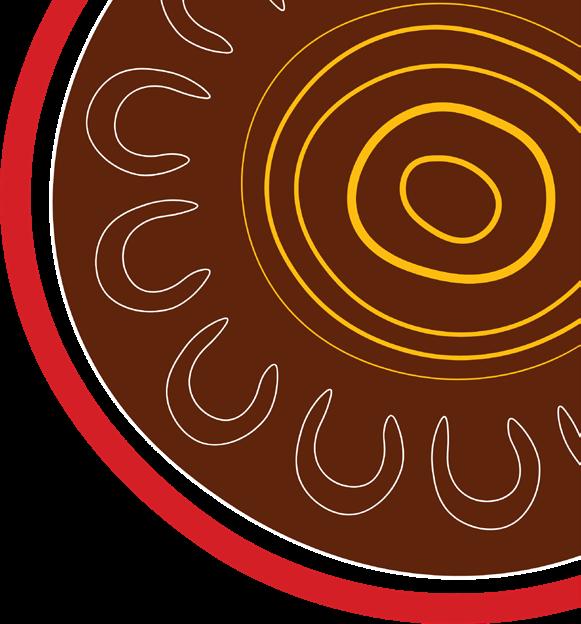
The current Archdiocesan Reflect RAP Working Group (WG) was formed in May 2024, after conversations with Aboriginal Catholic Ministry, Reconciliation WA, members of the Archdiocesan Executive Team, Catholic Education Western Australia and the National Aboriginal and Torres Strait Islander Catholic Council.
It is timely that the Archdiocese renews its effort in developing its second Reflect RAP. This Reflect RAP continues the aim of developing a broad-based Archdiocesan vision that continues to respond to Pope St John Paul II’s letter to Aboriginal and Torres Strait Islander peoples upon his visit to Australia in 1986.
Much has happened over the past few years as the Catholic Church in Australia looks to centrally placing Aboriginal and Torres Strait Islander peoples, their rich and ancient histories, cultures and connection to land in its mission of reconciliation. The Catholic Archdiocese of Perth is resolute in redressing in its capacity the outcome of the 2023 Referendum on the enshrined Voice of Aboriginal and Torres Strait Islander Peoples in the Constitution. In step with the Catholic Bishops of Australia, the Catholic Archdiocese of Perth is working in earnest to improve and increase our efforts to work more closely with Aboriginal and Torres Strait Islander peoples. The recent Plenary Council saw a renewal of the Catholic Church’s commitment to reconciliation as part of our efforts to heal our nation and our relationships.
The title of the 2023-2024 Social Justice Statement ‘Listen, Learn, Love’ from the Catholic Bishops affirms our determination towards true healing: listening to, learning from and loving our Aboriginal and Torres Strait Islander brothers and sisters.
As a Bishop, I have enjoyed the meetings with Elders in Perth and in my capacity as a member of the Bishops’ Commission for Relations with Aboriginal and Torres Strait peoples, with the Elders and pastoral workers of the Aboriginal Catholic Ministries nationally. Our yarning sessions and conferences have been occasions for listening and collaborative decision-making for action.
Ever since the establishment of the Catholic Church in Western Australia with the appointment of Bishop John Brady, a close relationship has been maintained with Aboriginal and Torres Strait Islander peoples. Relationships have been at times mutually beneficial, but at other times been complicated through a lack of understanding of the cultures, histories, and dignity of Aboriginal and Torres Strait Islander peoples by colonisers. This Reflect RAP is an important direction in responding to our commitment in the journey acknowledging and healing relationships with our Aboriginal and Torres Strait Islander brothers and sisters.
The Church recognises that Aboriginal and Torres Strait Islander peoples continue to face hardships as well as prejudice and racism which must be addressed for reconciliation to be advanced. Clergy and lay people, who serve in the Archdiocese, carrying out the mission of the Church, should learn the story of the peoples of this land and of what has happened to them. We must be part of the process of working toward a just world in our Archdiocese.
The Archdiocese of Perth believed that a Reflect RAP needed to be prepared so that
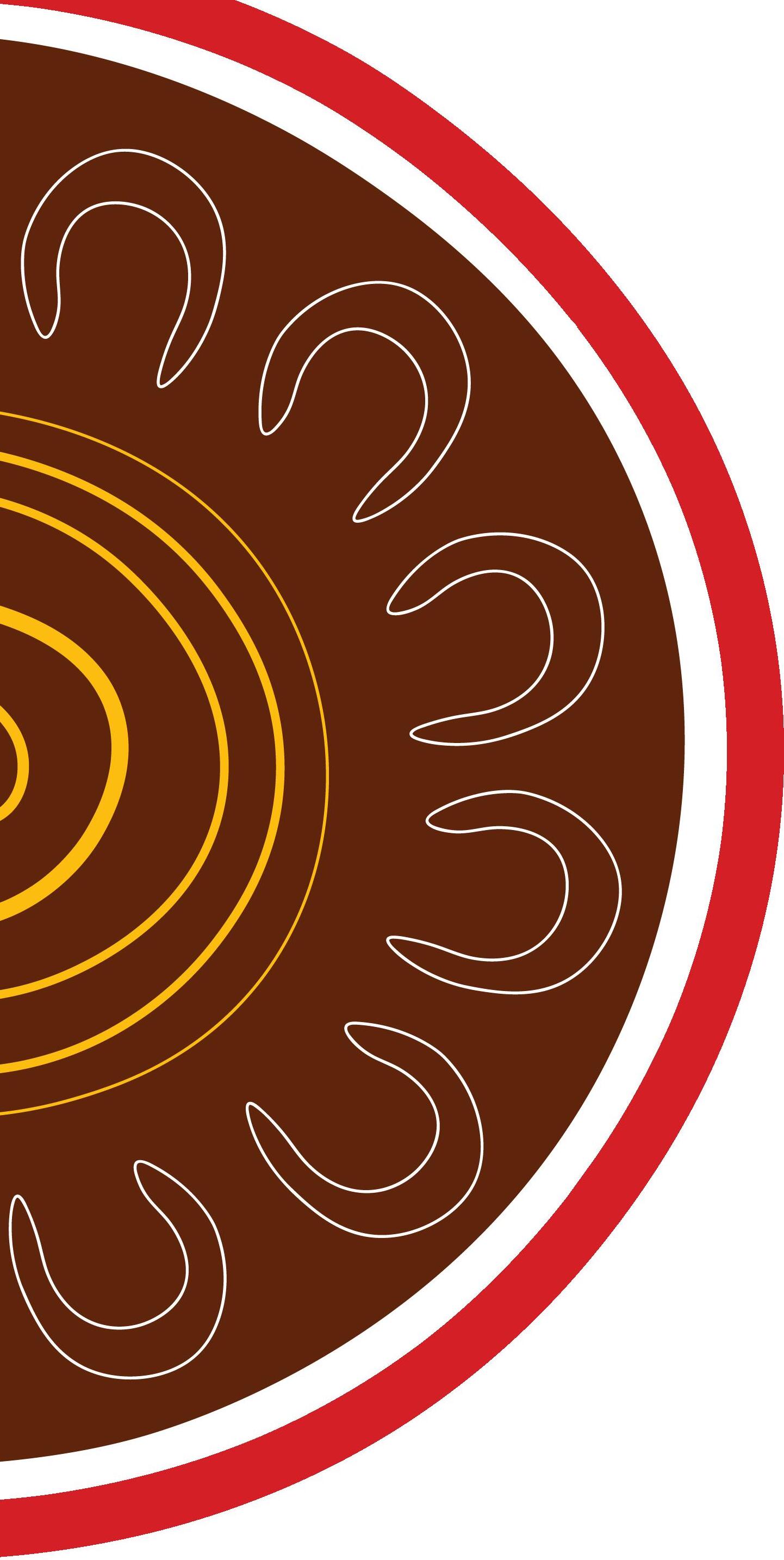
its parishes and agencies may better reach out to and support Aboriginal and Torres Strait Islander peoples in our community. We convened a Reflect RAP Working Group (WG) to develop this Plan. The Plan will be implemented by our agencies and proposed to our parishes as a template so that they can join in the Reflect RAP initiatives.
Reconciliation is a term that is very familiar to the Catholic community. One of the seven Sacraments of the Church is known as reconciliation. We realise that healing and growth in our own spirit requires that we acknowledge our faults and seek forgiveness. The Sacrament of Reconciliation promotes our healing and development to be the best that we can be. It is healing to acknowledge our need to forgive and be forgiven. One of the Yarning Sessions with Elders, hosted by our Reflect RAP WG, taught us that “In both communities there is a felt need for healing, acknowledgement, being heard, and expressing pain. But in both communities, there is also a need for purpose, to see that the process is not just talking, but also brings changes”.
The Reflect RAP offers Catholic people, Aboriginal and Torres Strait Islander peoples and non-Indigenous, opportunities to engage with one another. Events during the year provide us with the chance to not only understand its rich and important significance, but also to participate in earnest highlighting our solidarity with our Aboriginal and Torres Strait Islander brothers and sisters.
NAIDOC Week is celebrated in many ways, including through the liturgies that are prepared and distributed by the Catholic Church’s National Aboriginal and Torres Strait Islander Catholic Council. We are encouraged to attend events and commemorate significant dates such as National Apology Day, National Sorry Day, National Aboriginal and Torres Strait Islander Children’s Day. It is always important to show support with our physical presence as it is to assent with our minds.
The Church is a community of communities. She is spoken of as the Body of Christ, a people of many nations and cultures who bring a wide variety of gifts and experiences to the mission committed to her by Christ. Unless all the members of the Church have the chance to contribute then the body would be lacking.
Pope Francis declared 2025 as a Year of Jubilee with the theme Pilgrims of Hope. The Jubilee Year is a special year of grace. Occurring every 25 years, a Jubilee Year offers great spiritual, ecclesial and social significance in the life of the Church. It is the Holy Father’s prayer that as pilgrims on this earth, we need to not only care for our common home and contemplate the beauty of creation, but we need to hear the many voices and recover a sense of universal friendship affording all dignity and respect to all. It is my hope that the Reflect RAP in the Catholic Archdiocese of Perth will use this Jubilee Year for all Catholics to be fully Church as Jesus wants and that the contribution of our Aboriginal and Torres Strait Islander brothers and sisters’ contribution be joyfully received by all.
The Archdiocese, carrying out the mission of the Church, should learn the story of the people of this land and of what has happened to them. We have to be part of the process of working toward a just world in our Archdiocese.
Most Rev Donald G Sproxton DD VG Auxiliary Bishop of Perth Chair, Archdiocese of Perth Reflect Reconciliation Action Plan Working Group
Ms Sandra Brogden Team Leader, Aboriginal Education, Catholic Education Western Australia
Ms Donella Brown Director, Aboriginal Catholic Ministry
Mr Ward Italiano Chief Financial Officer, Archdiocese of Perth
Mrs Carol Mitchell
Director, Justice Ecology and Peace Office
Mr Jake Ricks
Secondary Teacher, Chisholm Catholic College
Ms Lennett Sandy
Noongar Pastoral Worker of Aboriginal Catholic Ministry
Dr Debra Sayce
Head of Mission Enhancement and Outreach, Archdiocesan Agencies Deputy Chair Archdiocese of Perth Reflect Reconciliation Action Plan Working Group
Ms Trish Sumich

Head of People and Culture, Archdiocese of Perth Deputy Chair Archdiocese of Perth Reflect Reconciliation Action Plan Working Group
Mrs Bibiana Kwaramba
Administration Officer, Office of Communications Executive Officer

The Archdiocese of Perth has funded the Aboriginal Catholic Ministry (ACM) since the early 1970s. The objective of the ACM is to assist the Archdiocese of Perth in fulfilling its responsibility in advancing the Mission of the Church in pastoral care for the Aboriginal Catholic Community. This is undertaken in accordance with the beliefs, values, traditions and social teaching of the Catholic Church.
The Aboriginal Catholic Ministry main functions include pastoral visits to hospital, homes and hostels, assistance in the sacramental preparation for children and adults and to provide pastoral care and support in the preparation and administration of funeral services. Inside these services, the Ministry delivers formation and faith development of Aboriginal and Torres Strait Islander peoples and provide opportunities for social gatherings and support to the Catholic parishes in their ministry with Aboriginal and Torres Strait Islander peoples and collaborating with other organisations to achieve the ACM mission.
The Committee of Management guides and assists the Ministry and the Archdiocese of Perth in the Aboriginal apostolate. It is made up of six Aboriginal people who meet approximately six times a year.
The ACM and Archdiocese are also involved in the National Aboriginal Torres Strait Islander Catholic Council which is the peak advisory body to the Australian Catholic Bishops on issues relating to Aboriginal and Torres Strait Islander Catholics.
www.acm.perthcatholic.org.au www.natsicc.org.au
The Catholic Archdiocese of Perth has funded Daydawn Advocacy Centre since 2007. This service advocates for Aboriginal and Torres Strait Islander peoples in the areas of housing and homelessness. For those who want help, Daydawn can assist in applications for those who want to be placed on the public housing waitlist and tenants who are having difficulty with public housing demands. Daydawn also provides advice to the State Government on policies and procedures in the areas of public housing and homelessness.
Daydawn is also a place where Aboriginal and Torres Strait leaders and families can exchange ideas in areas that impact them and provide referrals and moral support in relation to the National Redress Scheme and related trauma.




The Justice, Ecology & Development Office (JEDO) is concerned with defending individual human dignity, promoting solidarity and fostering the common good. The Justice, Ecology and Development Offices’ work seeks to cultivate personal and social responsibility and stand with the marginalised to actively safeguard the integrity of all creation.
JEDO draws upon social teachings of the Catholic Church in its work. This includes educational opportunities and resources to promote deeper understanding and commitment to the Church’s social mission amongst people in the Archdiocese. It works with parishes, educational environments, organisation and agencies in the areas of peace, justice and ecology. JEDO also supports local Catholic action groups concerned with social disadvantage. A core component of JEDO’s work is to ensure that the Social Justice Statements of the Australian Catholic Bishops is disseminated across the Archdiocese. The 2023 Statement, Listen, Learn, Love – a New Engagement with Aboriginal and Torres Strait Islander Peoples figured prominently in its 2023 – 2024 work.


The Archdiocese of Perth commits to the deliverables that have been developed in response to feedback from the Elders of the Aboriginal and Torres Strait Islander Catholic community.
Our deliverables and actions are listed under the three pillars of Relationships, Respect, Opportunities and built upon a foundation of Governance. From our community engagement, we have focused on cultural protocols and rituals, identifying and developing connections through listening and learning, and the importance of sharing stories.
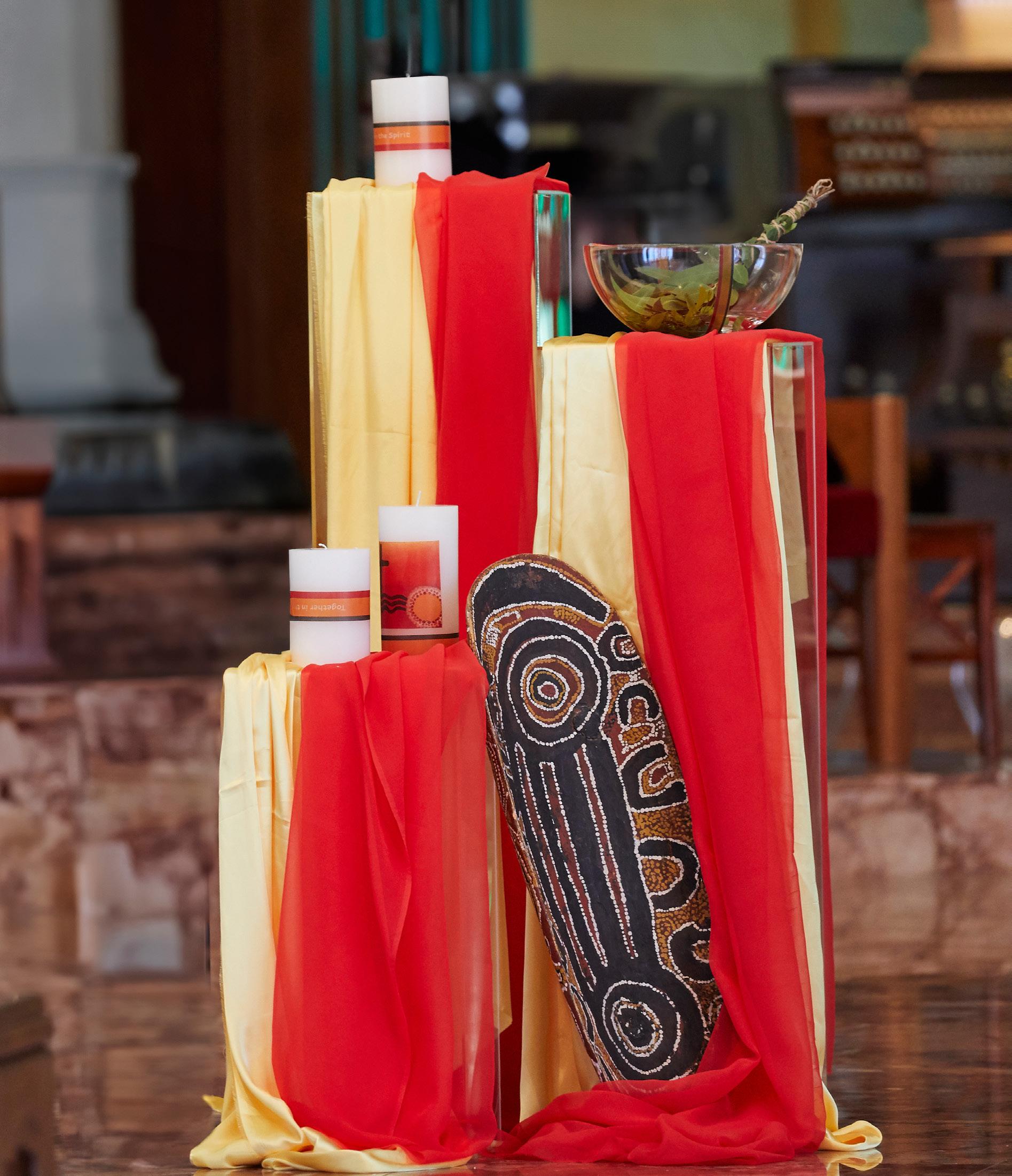


1. Establish and strengthen mutually beneficial relationships with Aboriginal and stakeholders and organisations
Identify Aboriginal and Torres Strait Islander stakeholders and organisations within our local area or sphere of influence.
• Connect with The National Aboriginal and Torres Strait Islander Catholic Council
• Connect with Yokai; Healing our Spirit (A Noongar call to action) about the Stolen Generation and share with the Archdiocese, e.g. movie or video perhaps via intranet (e.g. Genocide in a Wildflower State).
• Invite Elders to significant Archdiocesan celebrations and other events and convey a willingness to accept invitations to Aboriginal Cultural community events.
• Invite an elder to do the Smoking Ceremony and Welcome to Country at the Aboriginal Sunday Mass October 2025.
Research best practice and principles that support partnerships with Aboriginal stakeholders and organisations.
• Connect within our Catholic networks and review their RAPs over the past two years to understand their achievements.
August 2025
Responsibility
Director of Aboriginal Catholic Ministry
August 2025
Director of Aboriginal Catholic Ministry
September 2025
Officer of Justice Ecology & Peace
October 2025
Director of Aboriginal Catholic Ministry
October 2025
Director of Aboriginal Catholic Ministry
November 2025
November 2025
Head of Mission Enhancement & Outreach
Head of Mission Enhancement & Outreach, Team Leader, CEWA Aboriginal Education Team

Deliverable Action
2. Build relationships through celebrating National Reconciliation Week (NRW).
Circulate Reconciliation Australia’s NRW resources and reconciliation material through communication channels.
• Circulate information and promotional materials with agencies, staff and parishes.
Reflect RAP Working group (WG) members to participate in an external NRW events.
• Register with Reconciliation WA for key events.
• Reflect RAP WG members to participate in an external NRW event
• Encourage and support staff, senior leaders and volunteers to participate in at least one external event to recognize and celebrate NRW.
Responsibility Timeline
September 2025
Communications Manager
October 2025
October 2025
27 May - 3 June 2025
27 May - 3 June 2025
17 May - 3 June 2025
Officer of Justice Ecology & Peace
Head of Mission Enhancement & Outreach
Head of Mission Enhancement & Outreach
Head of Mission Enhancement & Outreach
Officer of Justice Ecology & Peace
3. Promote reconciliation through our sphere of influences
Communicate our commitment to reconciliation with a comprehensive Communication Plan
• Identify and meet with agencies within the Archdiocese to discuss joining the Reflect RAP journey.
• In the quarterly induction, inform and engage our people of the Reflect RAP.
Provide educative information to bring awareness of past and present issues that Aboriginal and Torre Strait Islander peoples face.
August 2025 August 2025
September 2025
April 2026
Communications Manager
Head of Mission Enhancement & Outreach
Head of People & Culture
Head of People & Culture

Responsibility
4. Promote positive race relations through antidiscrimination strategies
• Share information on what a RAP is and display the Archdiocesan Reflect RAP to the Catholic community and staff via the internet, intranet and publications.
Identify external stakeholders that our organisation can engage with in our reconciliation journey
• Membership of Reconciliation WA, working with established Catholic agencies engaging with their broad network to build upon relationships.
• Catholic Archdiocese of Perth Auxiliary Bishop promote Aboriginal and Torres Strait Islander people relations, connect at the national level with National Aboriginal and Torres Strait Islander Catholic Council.
Continue to Identify RAP and other like-minded organisations that we can approach to collaborate with on our reconciliation journey.
Research best practice and policies in areas of race relations and anti-discrimination.
Conduct a review of employment policies and procedures to identify existing discrimination provisions, and update future needs.
October 2025
Communications Manager
August 2025
Officer of Justice Ecology & Peace
September 2025
Head of People & Culture
November 2025
Auxiliary Bishop of Perth
September 2025
Officer of Justice Ecology & Peace
March 2026
Head of People & Culture
April 2026
Head of People & Culture


Responsibility Timeline
5. Increase understanding, value and recognition of Aboriginal cultures, histories, knowledge and rights through cultural learning.
Develop a business case for increasing understanding, value and recognition of Aboriginal and Torres Strait Islander cultures, histories, knowledge and rights within our organisation.
• Conduct a review of cultural learning needs of staff and develop a strategy for rolling out cultural learning for all staff across the Archdiocese.
• Engage with National Aboriginal and Torres Strait Islander Catholic Council (NATSICC) in order to purchase the license for the online Cross-Cultural Competency in a Catholic context for access by staff.
• Provide opportunities for staff to attend the MercyCare Aboriginal Cross Cultural inperson training.
• Ensure professional development and formation opportunities include Aboriginal and Torres Strait histories, cultures, histories and stories where appropriate.
• Communicate the Australian Catholic Bishops Conference Justice Statements that pertain to issues around Aboriginal and Torres Strait Islander cultures stories and issue.
December 2025
Chief Financial Officer
March 2026
Head of People & Culture
August 2025
Head of People & Culture
November 2025
Head of People & Culture
February 2026
Head of People & Culture
January 2026
Officer of Justice Ecology & Peace

6. Demonstrate respect to Aboriginal peoples by observing cultural protocols. Responsibility Timeline
Develop an understanding of the local Traditional Owners or Custodians of the lands and waters within our organisation’s operational area.
• Invite Traditional Custodians to provide a Welcome to Country at significant Archdiocesan gatherings. Compile a list of Noongar Elders that can be invited to provide a Welcome to Country (and mention their language group in the Welcome address).
Increase staff’s understanding of the purpose and significance behind cultural protocols, including Acknowledgment of Country and Welcome to Country protocols
• Develop guidelines outlining the purpose and significance behind cultural protocols.
• Encourage parishes to build an understanding of Traditional Owners or Custodians of the lands and waters within their organisation’s operational area.
September 2025
Director of Aboriginal Catholic Ministry
September 2025
Director of Aboriginal Catholic Ministry
September 2025
Director of Aboriginal Catholic Ministry
September 2025
February 2026
Officer of Justice Ecology & Peace
Head of Mission Enhancement & Outreach


7. Build respect for Aboriginal and Torres Strait Islander cultures and histories by celebrating NAIDOC Week
Raise awareness and share information with our staff about the meaning of NAIDOC.
• Each Office and Agency set up email signature that include Acknowledgement to Country in which the entity is operating for the month leading into NAIDOC Week.
• Promote NAIDOC Week in parishes
Introducing staff to NAIDOC Week by promoting local events through staff communication channels.
• Support Aboriginal Catholic Ministry activities that introduce staff to NAIDOC Week by encouraging participation in local events.
Invite Reflect RAP WG to participate in NAIDOC Week events.
• Provide opportunities of liturgical workshop drawing from the Catholic Church’s National Aboriginal and Torres Strait Islander Catholic Council for Aboriginal Sunday.
May (Annually)
May (Annually)
May (Annually)
May (Annually)
6-13 July 2025 First Week in July (Annually)
Head of People & Culture
Head of People & Culture Manager, Communications Manager, Communications
8. Improve employment outcome by increasing Aboriginal and Torres Strait Islander recruitment retention and professional development
Develop a formal strategy for Aboriginal and Torres Strait employment within our organisation.
• Begin to create a culturally safe environment, by discussing at the quarterly induction program.
6-13 July 2025 First Week in July (Annually)
October (Annually)
Head of Mission Enhancement & Outreach Head of People & Culture
Head of Mission Enhancement & Outreach
May 2026
Head of People & Culture
September 2026
Head of People & Culture

Commence building on understanding of current Aboriginal and Torres Strait Islander staffing to inform future employment and professional development opportunities.
• Within the payroll system ensure with self-service function, people can identify as Aboriginal and/or Torres Strait Islander people.
• Create a culturally supportive environment that is embedded in the Archdiocesan code of conduct.
9. Increase Aboriginal and Torres Strait Islander supplier diversity to support improved economic and social outcomes.
Investigate Supply Nation membership to commit and support Aboriginal businesses.
Develop a business case for Aboriginal and Torres Strait Islander employment owned businesses
• Review like organisations with regards to Aboriginal and Torres Strait Islander suppliers.
• Include in catering supply organisations, which are Aboriginal and Torres Strait Islander owned organisations.
November 2026
Head of People & Culture
November 2025
Head of People & Culture
November 2025
Head of People & Culture
November 2025
March 2026
January 2026
January 2026


10. Build respect for Aboriginal and Torres Strait Islander cultures and histories by celebrating NAIDOC Week
Establish and maintain a Reflect RAP WG to govern Reflect RAP implementation.
Ensure that the Reflect RAP WG includes some of the key stakeholders who have accepted responsibility within Reflect RAP.
Draft Terms of Reference for the Reflect RAP WG.
Establish an Aboriginal & Torres Strait Islander representation on the Reflect RAP WG.
August 2025
August 2025
Head of People & Culture
Head of People & Culture
August 2025
August 2025
11. Provide appropriate support for effective implementation of Reflect RAP commitments.
Define resource needs for Reflect RAP implementation.
Maintain a senior leader in the delivery of Reflect RAP commitments and review the appointment after 6 months.
Define appropriate systems and work capability to track, measure and report Reflect RAP commitments.
October 2025
August 2025
Head of People & Culture
Head of People & Culture
Chief Finance Officer
Executive Director, Office of the Archbishop
October 2026
Head of People & Culture

12. Build accountability and transparency through reporting Reflect RAP achievements, challenges and learnings both internally and externally.
Contact Reconciliation Australia to verify our primary and secondary contact details are up to date.
Bi-annual Report to the Archbishop on the progress of the Reflect RAP.
Contact Reconciliation Australia to request our unique link, to access the online RAP Impact Survey.
Complete and submit the annual RAP Impact Survey to Reconciliation Australia (online reporting) with a copy to the Archbishop of Perth.
August 2025 September 2025 March 2026
August 2025
September (Annually)
13. Continue our reconciliation journey by developing our next RAP.
Register by Reconciliation Australia’s website to begin developing our next RAP.
November 2025
Head of People & Culture
A future goal is to seek ways to connect Youth back to Church through a lived spirituality of Church.
Providing spiritual and pastoral assistance to families to plan funerals.
Walk alongside nonAboriginal community in parishes, schools, Archdiocese agencies and other groups in the community.
Providing opportunities for Aboriginal people to access the Sacramental program. Most families want children to be baptised but also to offer further opportunities of preparation for Reconciliation, Eucharist and Confirmation.
The handprints represent the 7 Messages of ACM. It is also symbolic of giving and receiving the messages as we walk alongside our people in the community.
There are different shapes and patterns throughout the background which are simply each person’s story or involvement within the ACM/ Archdiocese.
Coordinating Sunday Masses for people who still have a strong connection to Church and to gather as Church in less formal ways i.e., Monthly Picnic Masses when the weather is fine.
Visiting homes- keeping connections with Aboriginal families and particularly making sure that our Elders are OK and providing opportunities to get them together e.g. social gatherings and get togethers for special occasions.
Visiting Aboriginal hostels – providing spiritual and pastoral support, especially for those that are ‘off country’.
This represents the Aboriginal Catholic Ministry. It’s almost like a shining light looking over the story in the artwork.
The ACM is an important part of the Archdiocese of Perth, and the work they do with the Aboriginal community plays a significant part in the journey of reconciliation.
There is also an important role to educate, share stories and be active in the Archdioceses Reconciliation Journey.
The history and journey in WA. From small beginnings leading into what the Archdiocese of Perth is today. The pathways with footprints as well as the meeting places along the way signify the growth and journey going upwards into the present. Each meeting place has people sitting around, and the numbers grow as you walk along the path.
The dark brown shapes and patterns signify the stories and aspects of the journey. Visiting hospitalsproviding spiritual and pastoral support while in hospital and following up if requested.
The main area of work is in keeping connections strong with Aboriginal people.
Archdiocese of Perth Reflect Reconciliation Action Plan 2025 - 2026 Digital Version
Contact Information
Dr Debra Sayce
Head of Mission Enhancement & Outreach: Archdiocesan Agencies


debra.sayce@perthcatholic.org.au 08 6104 3600